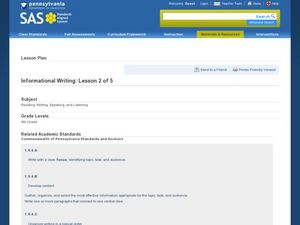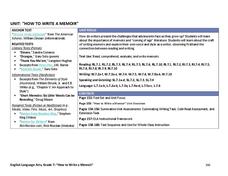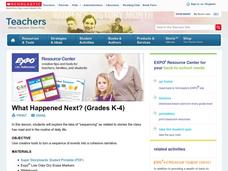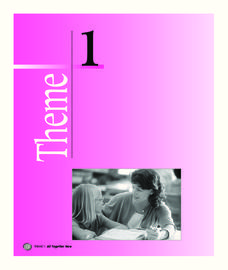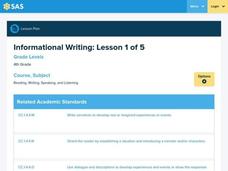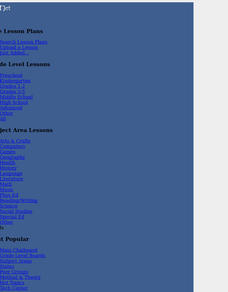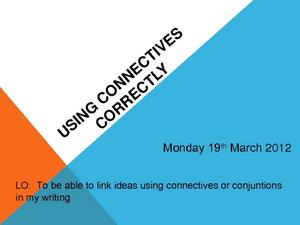Curated OER
Using Context Clues
Middle schoolers receive a handout that lists the five types of context clues. The class divides up into groups of three or four, and each group chooses five unfamiliar words. They write a multiple-choice question for each of their five...
Pennsylvania Department of Education
Informational Writing: Lesson 2 of 5
Introduce expository writing to your elementary learners. Young authors write a three-paragraph informational paper using the steps of the writing process. They follow guided lessons to experience each of five steps. Included are tons of...
Curated OER
Sequencing Events
Using The Very Hungry Caterpillar by Eric Carle, pupils practice sequencing events in a story. After reading the story, they head to the computer lab to use Kidspiration to sequence events. Then they create their own books to demonstrate...
Curated OER
Understanding and Using Root Words to Expand Vocabulary
Middle schoolers engage in a lesson which reminds them that root words indicate the base meaning of a word, and that those roots are found in many different words that have similar meanings. Pairs of pupils use construction paper and...
Curated OER
The Ultimate Survivor Using Hatchet by Gary Paulsen
What items would you need to survive if you were stranded in a remote place? Using chapter 10 of Gary Paulsen's Hatchet, middle-schoolers work through a Six Trait writing activity to create a story about their own survival in a similar...
Louisiana Department of Education
How to Write a Memoir
Who are we and what shapes our identities? Seventh graders work to answer this question as they learn how to write a memoir. Full of non-print resources and supplemental texts that range from fiction to non-fiction, scholars write their...
Curated OER
Fairy Tales
Once upon a time are four words most children are familiar with when reading a fairy tale. But do they know that fairy tales are a great way to learn the literary elements of reading and writing? Use a thorough fairy tale unit to teach...
Scholastic
What Happened Next? (Grades K-4)
Explore the structure of narrative writing with this fun, collaborative lesson. Start by reading aloud a short story, asking small groups of learners to fill in key events on a large story board prepared on the class whiteboard....
Curated OER
Order! Order!
Polish organization skills in your youngsters. With this lesson, they are introduced to the trait of organization and participate in activities that reinforce organization. They cut apart a familiar story, receive different parts of the...
EngageNY
Recursive Formulas for Sequences
Provide Algebra I learners with a logical approach to making connections between the types of sequences and formulas with a lesson that uses what class members know about explicit formulas to develop an understanding of recursive formulas.
Houghton Mifflin Harcourt
All Together Now: Extra Support Lessons (Theme 1)
All Together Now is the theme of this series of extra support lessons. The collection aids the instruction of blending sounds and reading high-frequency words through writing and reading sentences. Support also engages pupils in...
West Contra Costa Unified School District
Connecting Arithmetic Sequences to Linear Equations
Common difference is to arithmetic sequences as what is to linear equations? (Answer: slope) Pupils learn how arithmetic sequences can be considered as linear patterns. They then write linear equations to represent arithmetic sequences...
ReadWriteThink
A Picture's Worth a Thousand Words: From Image to Detailed Narrative
A picture's worth a thousand words—and even more inspiration! A visual activity uses photographs to inspire writers. The process teaches aspects of narrative writing, such as point of view and characterization.
Curated OER
Using a Computer to Write a Letter: Verbs (Sequencing)
Review sequencing by providing your English language learners with this mix of sentences. Cut the paper into 20 strips, and have each learner rearrange them into the correct order. Don't forget to keep one copy with the correct order!
Virginia Department of Education
Developing an essay: Using specific nouns, strong verbs, and vivid adjectives
Feeling bored and unimpressed with word choice in your class? If so, consider this activity, which focuses on using specific and precise language. Pupils use highlighters, brainstorm independently and in small groups, and create a poster...
Curated OER
Joining Sentences
Sentence combining meets multiple objectives for writers, and they are all available in this informational text exercise. Learners read a mixed-up excerpt about the history of chess, putting 15 sentences into logical order. Have a...
Curriculum
Expository Writing
The beauty of the way this expository writing resource is structured is that the units can be presented as a complete writing workshop or sequenced throughout a course of study
Lake Zurich Community Unit
Inequality Word Problems
This inequality word problems activity is ideal to assess your learners' understanding of inequality and linear concepts around solving and writing equations and inequalities. Equations, graphs and real-life scenarios are used to assure...
PBS
Copyright and Fair Use
When is using someone else's copyrighted material appropriate? Learn about copyright and fair use with a instructional activity from PBS.org. Scholars read through a reference sheet about authors' rights and users' rights, and then...
Pennsylvania Department of Education
Informational Writing
Emerging writers identify an informational piece of writing. They are provided with examples of informational writing and view a PowerPoint on narrative writing. Then, they design their own informational writing with a brochure,...
Curated OER
Transition Words in Expository Writing
Create to learn! Your class can create posters of transitional words and phrases to help them compose an explanatory text. They work in groups and focus on one type of transition (time, place, importance, etc.). They also create a poster...
Curated OER
Classical Period: Understanding Four-Bar Sequences
Her is an interesting topic, as well as a great way to teach it! You'll find two worksheets on this link, one for the teacher, and one for the learner. Worksheet one describes how classical composers used musical repetition to make their...
Curated OER
The Beginning, The Middle, & The End
Cut magazine pictures into three sections, having your youngsters piece the pictures back together. With this fun activity, they discover the importance of sequencing a story. Then they use a fun template (shaped like a burger) to write...
Curated OER
Using Connectives Correctly
After delving into the proper use of conjunctions, learners write their own stories focusing on using connecting words. First, they discuss the different types of conjunctions. Those include conjunctions used to add further information,...



